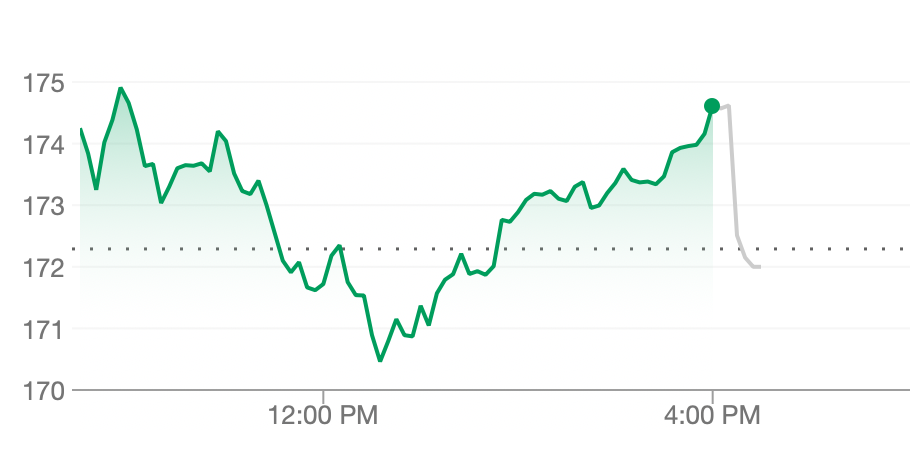Philips Future Health Index 2025: AI's Transformative Potential In Global Healthcare

Table of Contents
Enhanced Diagnostics and Disease Prediction with AI
AI algorithms are revolutionizing diagnostics and disease prediction. Their ability to analyze medical images—X-rays, CT scans, MRIs—far surpasses human capabilities in both speed and accuracy. This leads to earlier and more precise diagnoses, significantly improving patient outcomes. AI's role in predictive analytics is equally transformative. By analyzing vast datasets of patient information, AI can identify individuals at high risk of developing specific diseases, enabling proactive interventions and preventative care.
- Early Disease Detection: AI is proving invaluable in early cancer screening, identifying subtle anomalies often missed by the human eye. The Philips Future Health Index 2025 highlighted successful applications in detecting early-stage lung cancer and breast cancer.
- Cardiovascular Disease Risk Assessment: AI algorithms can analyze risk factors like age, lifestyle, genetics, and existing conditions to predict the likelihood of cardiovascular events, allowing for timely interventions to reduce risk. The report indicates a significant reduction in cardiovascular-related mortality in regions with widespread AI-driven risk assessment programs.
- Improved Treatment Outcomes: By facilitating earlier and more accurate diagnoses, AI contributes directly to improved treatment outcomes and reduced mortality rates across various diseases.
Personalized Medicine and Treatment Optimization through AI
AI is ushering in the era of personalized medicine, tailoring treatments to individual patients based on their unique genetic makeup, lifestyle, and medical history. This approach moves beyond a one-size-fits-all model, optimizing treatment efficacy and minimizing side effects. AI also plays a crucial role in drug discovery and development, accelerating the process and reducing costs significantly.
- Targeted Therapies: AI helps identify specific genetic markers associated with diseases, enabling the development of targeted therapies that attack disease cells with greater precision, reducing harm to healthy cells.
- Personalized Medication Dosages: AI algorithms can analyze patient data to determine the optimal medication dosage, minimizing adverse effects and maximizing therapeutic benefits. The Philips Future Health Index 2025 notes a substantial increase in patient adherence to medication regimens when dosage is personalized with AI assistance.
- Ethical Considerations: While promising, personalized medicine raises ethical concerns surrounding data privacy and algorithmic bias. Ensuring equitable access to AI-powered healthcare solutions and mitigating biases in algorithms are crucial for responsible implementation.
AI-Powered Automation and Efficiency in Healthcare Operations
AI is streamlining healthcare operations, automating administrative tasks and freeing up healthcare professionals to focus on patient care. This increased efficiency translates to reduced costs and improved patient experience. AI-powered chatbots and virtual assistants are also enhancing patient communication and support.
- Automation of Administrative Tasks: AI automates appointment scheduling, medical record management, and claims processing, reducing administrative burdens and freeing up staff for patient interaction.
- Improved Operational Efficiency: By automating routine tasks, AI frees up valuable time and resources, allowing healthcare systems to operate more efficiently and cost-effectively. The Philips Future Health Index 2025 points to a significant increase in productivity in hospitals that have adopted AI-driven automation solutions.
- AI-Powered Chatbots and Virtual Assistants: These tools provide patients with 24/7 access to information, appointment scheduling assistance, and basic medical advice, enhancing patient experience and reducing the workload on healthcare staff.
Addressing Challenges and Concerns Regarding AI in Healthcare
The implementation of AI in healthcare is not without its challenges. Data security, ethical considerations, regulatory hurdles, and the potential for workforce displacement are significant concerns. Responsible AI development and deployment are paramount.
- Data Security and Privacy: Protecting sensitive patient data is crucial, requiring robust security measures and compliance with data privacy regulations.
- Algorithmic Bias: AI algorithms can inherit and amplify biases present in the data they are trained on, leading to unfair or discriminatory outcomes. Mitigating algorithmic bias is essential for equitable access to AI-powered healthcare.
- Regulatory Hurdles: Navigating the regulatory landscape for AI-powered medical devices and software is complex and requires careful consideration.
- Workforce Displacement Concerns: Concerns exist about the potential displacement of healthcare workers due to automation. Reskilling and upskilling initiatives are necessary to adapt to the changing landscape.
The Future of Healthcare is AI-Driven
The Philips Future Health Index 2025 strongly indicates that AI will play a pivotal role in shaping the future of healthcare. AI's potential to enhance diagnostics, personalize treatment, and improve operational efficiency is undeniable. However, addressing the associated challenges through responsible development and deployment is crucial. By embracing AI responsibly, we can unlock its transformative potential for a healthier future. Discover the full impact of AI in healthcare by exploring the complete Philips Future Health Index 2025 report and unlock the potential of AI-powered solutions for a healthier future. The integration of AI in healthcare is no longer a futuristic concept—it's the present and future of delivering better patient care and outcomes.

Featured Posts
-
 Wwe Wrestle Mania 41 Memorial Day Weekend Ticket And Golden Belt Sales Event
May 24, 2025
Wwe Wrestle Mania 41 Memorial Day Weekend Ticket And Golden Belt Sales Event
May 24, 2025 -
 New Album Her Matt Maltese On Intimacy And Artistic Growth
May 24, 2025
New Album Her Matt Maltese On Intimacy And Artistic Growth
May 24, 2025 -
 Amundi Dow Jones Industrial Average Ucits Etf How To Interpret Net Asset Value
May 24, 2025
Amundi Dow Jones Industrial Average Ucits Etf How To Interpret Net Asset Value
May 24, 2025 -
 Apple Stock Price Drops On 900 Million Tariff Announcement
May 24, 2025
Apple Stock Price Drops On 900 Million Tariff Announcement
May 24, 2025 -
 Today Show Host Change Savannah Guthries Weekday Replacement
May 24, 2025
Today Show Host Change Savannah Guthries Weekday Replacement
May 24, 2025
